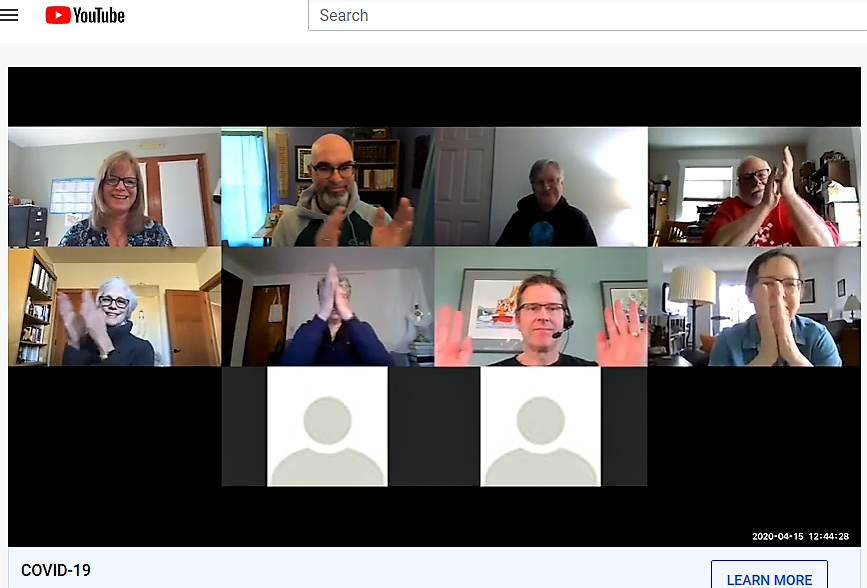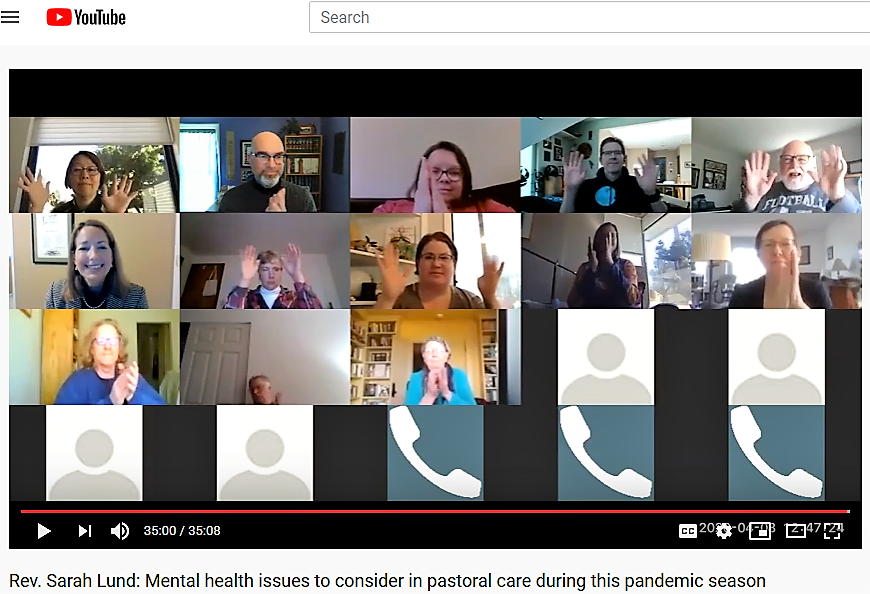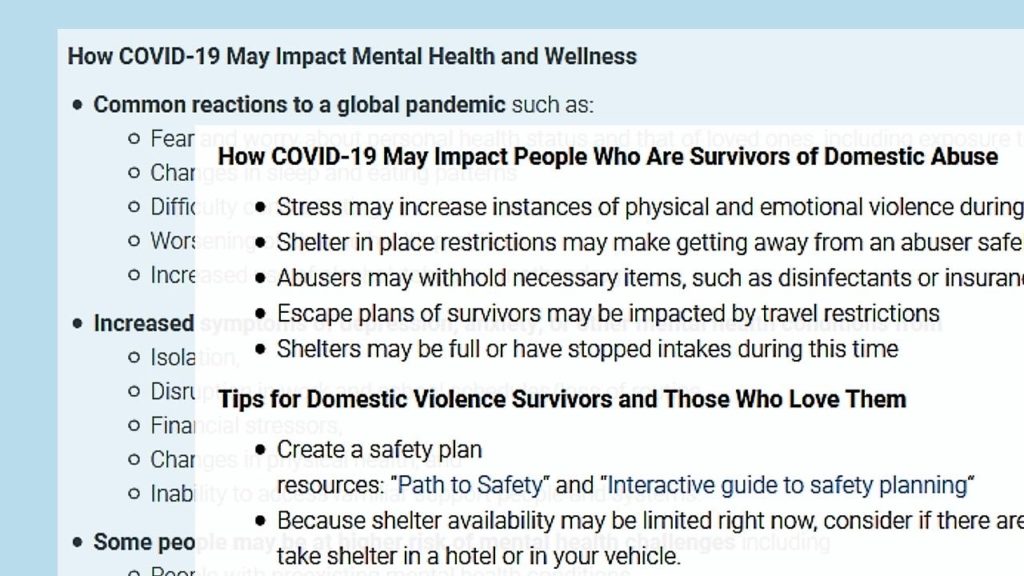Domestic violence, mental health issues heighten in pandemic; pastors, churches can respond
Domestic violence has increased worldwide during the COVID-19 pandemic. Stay-at-home orders have also heightened the intensity of mental health issues. Both are areas where pastors and congregations can help by being especially alert, according to United Church of Christ staff specialists.
Tips on what to watch for and what to do were shared by national UCC staff members in recent interactive conversations with local church leaders, organized by the denomination’s Pacific Northwest Conference.
Amy Johnson, minister for sexuality education and justice, and the Rev. Sarah Lund, minister for disabilities and mental health justice, were featured live on the webinar platform Zoom as part of a weekly series of conversations hosted by the Rev. Mike Denton, Conference minister of the Seattle-based UCC body.
The sessions were recorded and can be viewed on a YouTube channel that Denton has created, or by clicking the video icons at right.
When stay-at-home orders make things harder
“This is a challenging, tough topic,” Johnson said in introducing her April 15 presentation on domestic violence. “We wish people we are ministering to were not in these situations. But they are sometimes.”
A pandemic can create stress for anyone, Johnson said, “and when stress in increased, it can increase the instances of physical and emotional violence, especially during isolation. Many domestic violence service providers are seeing an uptick in calls and in requests for help. And that’s not only in this Conference, it’s not only in our state, it’s not only in our country. It’s in the entire world.”
Stay-at-home orders, in place in most U.S. states, can make things harder for people living with domestic violence, Johnson said. Those who abuse them may be at home more than usual, more manipulative and controlling, more prone to use alcohol or drugs.
She said abusers reportedly have made such threats as, “If you get COVID, I’ll kick you out of the house” or “I’m going to give you the virus on purpose.” Survivors may find it harder than usual to get away temporarily, or even to make and carry out a long-term escape plan.
How to help without in-person meetings
Church buildings sometimes function as physically safe spaces for survivors, so with the suspension of in-person worship and ministries, pastors and church leaders can help by “heightening your awareness that somebody might be in an unsafe situation,” Johnson said. Clues can come via Zoom meetings, online prayer requests or one-on-one phone conversations. For example, Johnson said, “you might just want to listen a little more carefully” when someone speaks about being stuck at home or makes excuses for a family member’s angry or violent behavior.
Leaders should keep the National Domestic Violence hotline number at hand (800-799-7233) and update themselves on which local shelters and domestic-violence agencies are open during the pandemic; it can vary by county and state. Johnson also recommended tips and practices outlined at the UCC’s Health and Wholeness in the Midst of COVID-19 web page.
Local resources may also be available. One call participant, the Rev. Bobbi Virta, pastor of United Church of Ferndale, Wash. – a longtime activist for survivors of domestic assault and sexual violence – shared news of a Faith Communities Toolkit produced in her county but that may be helpful anywhere.
Johnson said it’s unfortunate that some states have used the term “safer at home” during the current pandemic. “We need to be aware that that is really not true for some people,” she said. “It’s the opposite.”
Care with words, images for mental health in pandemic
In her April 8 presentation on mental health and the pandemic, Lund mentioned her own experience as with post-traumatic stress disorder. She and others with similar conditions are “hyperaware of our environment and our surroundings, so we’re always monitoring every situation for any signs of danger or harm,” she said.
“And so you can imagine opening your computer, looking at headlines, looking on Facebook – there are signs of danger and harm everywhere,” Lund said. “And so as we think about boundaries and how to take care of ourselves, I want you to think inclusively about people who are hypersensitive to signs of danger because they live with trauma.”
A good place for churches to start, Lund said, is with images and words choices in bulletins, emails, websites and social media. Examples: Pictures of the coronavirus itself or of people in masks can trigger anxious responses in people living with trauma. The commonly used term “online happy hour” might trigger people who battle addictions. And in live online meetings, it’s helpful to caution people if sensitive topics are about to be discussed.
Lund encouraged pastors to make extra efforts to “lay eyeballs” on anyone who hasn’t connected via online worship or in other ways during the pandemic. Isolation may be especially intense for people with mental challenges. Even by just saying hello through a window, “you can see if they’re eating, if they look healthy,” she said. “Regular, healthy eating patterns are important for mental health.”
Support pastors’ mental health, too
Lay leaders should give special attention to pastors’ mental health during the pandemic. The variety of unusual pressures – keeping up with parishioners without in-person worship, learning new technologies, working from homes with children and other family members present – may make ministry especially stressful now. Encourage self-care and time off, Lund said. Activate or re-activate a pastor-parish relations committee to offer support.
She directed pastors and lay leaders to more mental health resources at the UCC Health and Wholeness in the Midst of COVID-19 page and through the denomination’s WISE Congregations for Mental Health program.
Much of the work, Lund said, involves healthy boundaries for people with mental illness – and for those who minister to them as well. “Boundaries are something that are protected and guarded not only by the individual, but also by the whole congregation,” she said. “And so I invite us to see that as a community-care approach.”


Related News
A Prophetic Call for Justice and Peace in Palestine
The executive leaders of the United Church of Christ have issued the following statement...
Read More‘Love is Greater Than Fear’: Regional Youth Events get to the heart of gospel message
United Church of Christ teens attending this summer’s Regional Youth Events (RYE) are...
Read MoreUCC desk calendars available to order now
Prepare for your day, month and year with the United Church of Christ desk calendar —...
Read More


